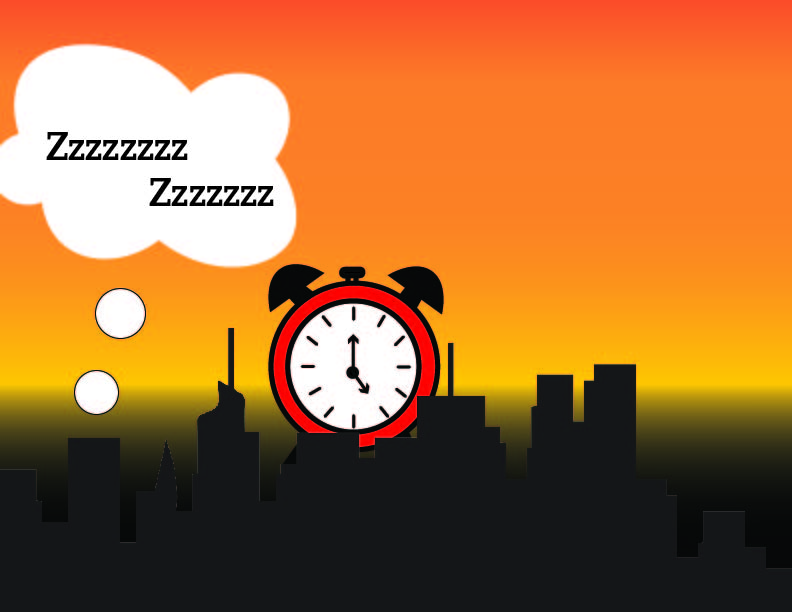It’s that dreadful time of the year again when I return from my classes at 2:15 p.m. and the sun sets less than three hours later. It feels as though the day is over; the darkness in the sky sends signals to my body that it’s time for me to sleep, even though I have not completed half of the tasks I had planned. Setting back the clock is setting back the mood and productivity of students. Instead, legislation should be enacted to make daylight saving permanent in the United States.
Since the 1966 Uniform Time Act, the U.S. has consistently shifted the times our society functions twice a year: once in the fall and once in the spring. Originally starting as a way to conserve energy, the time changes advance clocks by one hour during warmer months so darkness falls at a later time. However, at the end of daylight saving time the time change becomes more of a burden than a benefit as the sun sets earlier.
In 2018, the Sunshine Protection Act — a law that would make daylight saving time permanent — was first introduced. It made the most progress in 2022 as the Senate unanimously passed it, but it has made little-to-no movement since, as it was stalled in the House and expired after the last session of Congress.
Some people may argue that switching to permanent daylight saving time may throw off our circadian rhythm, but having a time switch twice throughout the year and losing an hour of daylight during the process feels even more detrimental to our sleep and productivity.
For the past 19 years of my life, I have experienced the brutal consequences of losing an hour of sunlight in the early evening of the first November Sunday. While I love the extra hour of sleep I get on the one night a year that clocks fall back, it’s a pleasure that doesn’t last for long, unlike the negative mental health effects the end of daylight saving time induces.
As a college student, I have busy days filled with classes, homework, studying, in addition to an internship and my social life. These activities are already difficult to balance, and feeling as though I’m losing an entire hour of my day worsens the situation.
In the meantime, it is important for students to take steps to form habits that decrease the negative effects of an earlier sunset.
I have noticed, mainly over the past year and a half while attending Fordham, that I often feel unproductive and unmotivated when daylight saving time ends. I procrastinate on assignments and fail to fulfill simple chores, not to mention experience a heightened feeling of depression caused by a lack of sunlight.
Seasonal Affective Disorder (SAD) is a type of depression that is often associated with changes in the seasons, specifically during fall and winter. The effects of SAD generally begin in early adulthood, the age category most college students fall under. Many symptoms of SAD can be linked to changes in the environment that are stimulated by the end of daylight saving.
A reduced amount of sunlight may decrease a person’s serotonin levels, the hormone responsible for maintaining happiness. A decrease in the serotonin hormone is linked to a higher risk of depression, meaning that this deficiency of sunlight is associated with SAD.
SAD can also lead to more severe forms of mental illness, such as anxiety or insomnia. Fordham’s Counseling and Psychological Services are available to help students navigate these challenging issues. However, a more effective way to combat these problems would be creating a society that solely functions under daylight saving time.
If the sun isn’t awake or working after 4:30 p.m., why should I be?
Furthermore, when the nights start to lengthen and we encounter more hours filled with darkness, our bodies begin to produce more melatonin, the hormone that helps regulate sleep.
The additional hours without daylight at night disrupt the body’s normal levels of melatonin, leading to increased tiredness. This excessive desire to sleep early in the evening is a nightmare for college students, a majority of which are chronic night owls, especially as the late-night study sessions of finals season approaches.
In the meantime, it is important for students to take steps to form habits that decrease the negative effects of an earlier sunset. For instance, it is necessary to maintain a regular sleep schedule.
According to extensive research obtained through sleep studies, although you may be tempted to go to bed earlier and sleep longer because of the little daylight, it’s important not to feed into your desires. Instead, go to bed at a reasonable time — between 10 and 11 p.m. — and allow yourself enough sleep, but not too much. Balance is key in this battle against darkness.
Additionally, you should increase your time in the sun. This may be difficult for busy college students, but even going outside for a quick 30 minute walk or opening your blinds while doing your homework could help. Sun lamps have also been proven an effective way to regulate your body’s melatonin levels, which helps control your serotonin levels as well, improving the negative side effects that accompany the end of daylight saving time.
These solutions are only temporary fixes, however. The only way to truly solve this issue is for the U.S. to come up with a solid plan to enforce permanent daylight saving time. If the sun isn’t awake or working after 4:30 p.m., why should I be?




Edward Davis • Jan 29, 2024 at 10:42 pm
Just Brilliant!
Kimberly Springs • Jan 28, 2024 at 6:59 pm
As mail carriers, we love daylight savings time. This means we do not have to work in the dark which is a challenge. It gives us time get our routes done and feel safe with the sun out
Kathy Mireault • Jan 28, 2024 at 5:35 pm
Wonderful notion! Eternal EDT!!
Dio Abreu • Jan 26, 2024 at 7:51 pm
Day light savings should be made permanent as soon as possible. SAD is real!! What can we do to get Congress to sign off on this Bill already??…is time! They’ve had on their desk for over a year!!